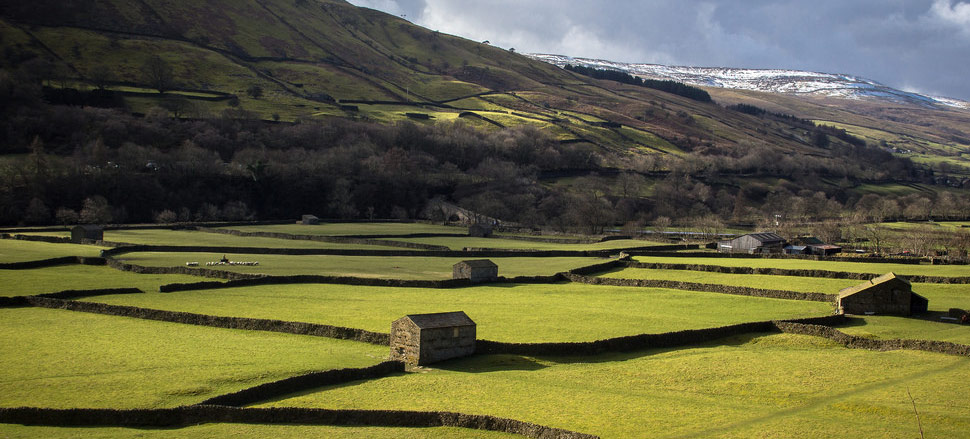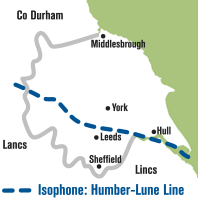 A tale of shifting isophones.
A tale of shifting isophones. |
Even allowing for the boundary changes of 1974, Yorkshire is still England’s biggest county. As you might expect, there is no single Yorkshire Dialect but, rather, a variety of speech patterns across the region. What passes for “Yorkshire” in most people’s imagination is, in fact, the dialect of the heavily industrialized West Riding (West Yorkshire and South Yorkshire after 1974.) This dialect ~ or at least accent – is familiar to most, thanks to Radio and TV dramas set in Yorkshire. Actors, however, rarely distinguish between this form of speech and the dialects of the rest of the county.
In fact, the traditional speech of the old North and East Ridings (North Yorkshire and Humberside / East Yorkshire) is quite different and has a much stronger Scandinavian influence. This distinction was first recognised formally at the turn of the 19th / 20th centuries, when linguists drew an isophone diagonally across the county from the northwest to the southeast, separating these two broadly distinguishable ways of speaking. It can be extended westwards through Lancashire to the estuary of the River Lune, and is sometimes called the Humber-Lune Line. Strictly speaking, the dialects spoken south and west of this isophone are Midland dialects, whereas the dialects spoken north and east of it are truly Northern. It is possible that the Midland form moved up into the region with people gravitating towards the manufacturing districts of the West Riding during the Industrial Revolution.
The main differences between the two areas relate to the pronunciation of certain verbs. School, for example, is traditionally pronounced skoo-il or skoil to the south and west, and skeel or skale to the north and east. Similarly, loaf, which has an almost standard pronunciation in the south and west, becomes lee-af or lay-af in the north and east, just as goose becomes gee-as. Perhaps the best known West Riding vowel form is the realization of o (as in hole) as oi. Thus coal hole becomes coil ’oil. A West Riding police station is often called a bobby ’oil.
It has to be said, though, that for most Yorkshire speakers, this isophone has now drifted northwards to the Tees. Even so, a number of older speakers (particularly in the remoter parts of the Dales, the North York Moors and the Yorkshire Wolds, do still preserve some of these Old Northern vowels. One hundred years ago, however, the change would have been instantly noticeable the moment you “crossed the line”. The distinction was particularly sharp at Selby, where the isophone followed the line of the River Ouse, dividing the West and East Ridings. Today, you really have to visit Durham and Northumberland to be sure of hearing younger speakers using the old north eastern forms.
Other distinctions – which have survived more or less intact despite massive social change – concern words relating to specific trades and occupations. There are agricultural terms, for example, in the North and East Ridings which are quite unknown in the West. Similarly, the mining, steel and textile terminology of the West Riding is little used in the North and East.
Pockets of rhoticity (the clear pronunciation of r after vowels, which was once common to all types of English: eg farmer and carter but is now associated chiefly with Scotland, Ireland, the West Country and the USA) survive in parts of Yorkshire. It is still quite common in the extreme western fringes of the West Riding where it borders with Lancashire, Some older speakers in the remoter parts of the North and East Ridings are still rhotic.
There probably is a “General Yorkshire” dialect now, common to the whole county, but – with care and experience – some of these fascinating variations may still be traced.
April 9th, 2025 Members are alerted to an email they may have r... Read more
The latest YDS publication is something very special, a translation in... Read more
Do you fancy a Bilberry Pie? It’s the latest publication from the ... Read more
Attention all members who pay their annual subscription by bank transf... Read more
The Paypal facility has now been removed and those wishing to purchase... Read more